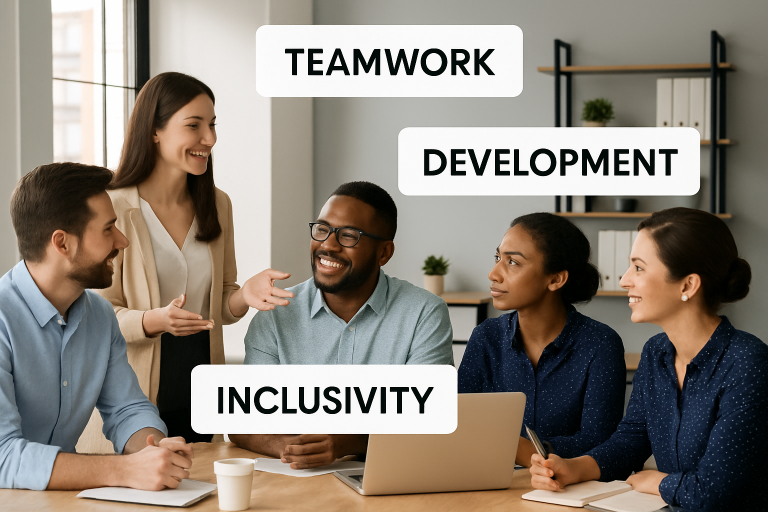People-Focused Talent Strategies That Drive Results

Introduction
As organizations strive to thrive amidst constant change, adopting people-focused talent strategies has become vital to business success. Leaders now recognize that investing in their people is not just a human resources initiative but a core business imperative. From cultivating existing employees to creating inclusive and empowering work environments, organizations can achieve sustainable growth by prioritizing their workforce. Talent management solutions provide the digital tools and frameworks to implement these strategies effectively.
Expert research underscores that companies with robust internal development programs and a focus on skills and inclusivity see clear gains in productivity, resilience, and employee satisfaction. Meanwhile, the rapid evolution of required job skills, coupled with the challenges of future workforce planning, has brought talent strategy to the top of mind for HR leaders and executives alike.
The following in-depth guide explores how prioritizing internal talent development, building a skills-based approach, fostering continuous learning, and championing inclusivity can help organizations build high-performing teams ready to meet today’s demands and tomorrow’s uncertainties.
Understanding—and acting on—the latest HR insights helps companies address talent shortages and distinctively align with evolving industry dynamics. This approach is foundational to navigating change, mitigating risks associated with new competitors, and innovating for long-term success.
Prioritizing Internal Talent Development
The ever-shifting business environment demands nimble and adaptable organizations. According to recent industry reports, to meet this challenge, more than 50% of Chief Human Resources Officers now place internal talent development ahead of external hiring as their most urgent strategic priority. This shift strengthens business continuity by identifying, developing, and elevating employees into leadership and critical roles.
A commitment to internal talent development also builds a culture of trust and belonging. Employees are more engaged when they see a clear pathway for growth and advancement. Internal mobility does more than save time and reduce recruiting costs—it energizes the workforce and sustains organizational performance even in turbulent times. Harvard Business Review offers insights on how businesses enhance internal mobility and cultivate future leaders through structured development programs.
Implementing Skills-Based Talent Strategies
Traditional approaches to talent management—long reliant on credentials and linear job descriptions—are rapidly losing relevance. Thriving organizations now transition toward skills-based strategies, evaluating talent by competencies and potential rather than tenure or education alone. This transition enhances agility and helps address concerns about looming talent shortages, which over half of business leaders cite as a top challenge.
Adopting a skills-based approach means using robust frameworks to map current and future competency needs and track employee development across all levels. This data-driven, dynamic perspective enables faster redeployment to mission-critical areas and empowers workers to shift roles as industry needs change. McKinsey & Company’s analysis demonstrates how skills-based workforce models can transform business adaptability and success.
Fostering a Culture of Continuous Learning
Creating an ecosystem of ongoing learning is crucial for workforce agility and long-term growth. In today’s fast-paced market, organizations must encourage employees at all levels to develop new capabilities and adapt quickly to new technologies and challenges. Comprehensive learning and development programs increase job satisfaction and help organizations fulfill their future talent needs from within.
This culture of continuous learning inspires innovation and positions businesses to remain competitive, even in times of uncertainty. The World Economic Forum has identified lifelong learning as one of the most critical business skills for the decade ahead. Organizations championing this mindset see measurable improvements in retention, employee morale, and overall business performance.
Embracing Diversity and Inclusion
Successful organizations recognize that inclusivity isn’t just about compliance—it’s a dynamic driver of innovation, collaboration, and market relevance. Companies that prioritize diversity across dimensions such as age, gender, culture, and background gain richer perspectives and enhanced problem-solving abilities. Age inclusivity, in particular, supports a more comprehensive understanding of customer needs and promotes intergenerational learning.
The benefits of a diverse workforce are well-established: inclusive businesses consistently outperform others in creativity, decision-making, and financial outcomes. Further, embedding inclusivity into talent strategies fosters a sense of belonging, making employees feel recognized and empowered to contribute their best work. The Society for Human Resource Management highlights that building genuinely inclusive organizations is linked to greater innovation and business results.
Leveraging Data-Driven Decision Making
Data analytics are transformative in modern talent management, enabling leaders to make evidence-based decisions aligned with strategic priorities. By leveraging information from performance data, pulse surveys, and predictive analytics, organizations can proactively identify potential flight risks, track skills gaps, and allocate resources more efficiently.
Informed talent decisions support real-time adjustments and long-range planning, ensuring organizations stay ahead of industry disruptions and emerging workforce trends. Proactive data use also improves transparency and accountability across teams, further enhancing engagement and performance.
Building Trust and Psychological Safety
The foundation of every high-performing team is trust. Leaders who invest in authentic communication, foster psychological safety, and encourage open expression of ideas create resilient and engaged workplaces. Psychological safety empowers employees to take risks, share feedback, and innovate without fear of retribution or ridicule.
Building this trust requires intentional effort—offering regular check-ins, nurturing personal connections, and demonstrating leadership transparency and integrity. Consistently high trust levels reduce attrition, strengthen morale, and accelerate creativity, giving organizations a competitive edge.
Conclusion
Shaping the future of work requires organizations to put people at the core of every talent decision. Businesses that nurture employees through skills-based development, mentorship, and continuous learning create workforces equipped to adapt in an ever-changing environment. Emphasizing inclusivity as a central priority ensures diverse perspectives are valued, fostering innovation and collaboration across teams. These efforts strengthen agility and build a sense of belonging, trust, and loyalty among employees—satisfaction and engagement rise when workers feel supported in their growth, fueling stronger performance. By aligning talent strategies with human-centered values, companies prepare to face tomorrow’s challenges with greater resilience, adaptability, and creativity—ultimately positioning themselves as employers of choice in an increasingly competitive landscape.





